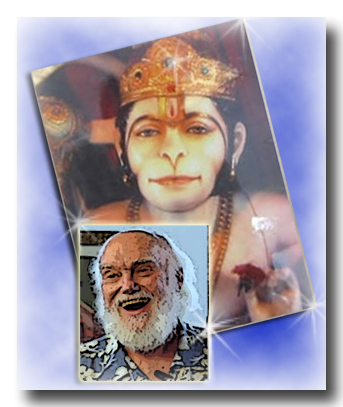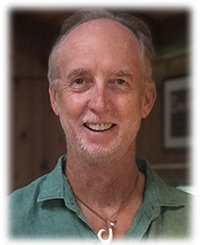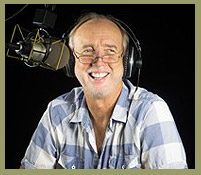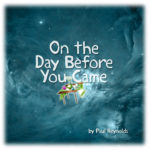A ‘Be Here Now’ Moment
From a Huffington Post Interview by Maria Schnall
…Ram Dass has had a colorful, mythical life of ongoing transformation, starting as Dr. Richard Alpert, a prominent Harvard psychologist and psychedelic pioneer with Dr. Timothy Leary, whose life radically changed when he visited  India in 1967, and met his guru Maharaj-ji, coming back to the states as Ram Dass (which means “Servant of God”). In 1997, he suffered a near-fatal stroke, which left him paralyzed on the right side of his body and expressive aphasia limiting his ability to speak, along with other challenging ailments. He wrote about this experience in his powerful book ‘Still Here’ and told me, “It’s all grace. The stroke graced my spiritual work because it took me inside.” The after effects of the stroke once again changed his life, but he continues to write, share and teach from his home in Maui, Hawaii.(*) His latest book is Polishing the Mirror: How to Live From Your Spiritual Heart, which gathers together his essential teachings for living in the present, and is described as a “complete guide to discovering who we are and why we are here, and how to become beacons of unconditional love.” He told me that one of his biggest hopes for readers of the book is that they will take away “that their primary identity is spiritual, that they are a spiritual being visiting humanity.”
India in 1967, and met his guru Maharaj-ji, coming back to the states as Ram Dass (which means “Servant of God”). In 1997, he suffered a near-fatal stroke, which left him paralyzed on the right side of his body and expressive aphasia limiting his ability to speak, along with other challenging ailments. He wrote about this experience in his powerful book ‘Still Here’ and told me, “It’s all grace. The stroke graced my spiritual work because it took me inside.” The after effects of the stroke once again changed his life, but he continues to write, share and teach from his home in Maui, Hawaii.(*) His latest book is Polishing the Mirror: How to Live From Your Spiritual Heart, which gathers together his essential teachings for living in the present, and is described as a “complete guide to discovering who we are and why we are here, and how to become beacons of unconditional love.” He told me that one of his biggest hopes for readers of the book is that they will take away “that their primary identity is spiritual, that they are a spiritual being visiting humanity.”
Marianne Schnall: … I’m a long time admirer of yours. I’ve read and been inspired by so many of your books – and as I’ve told people that I was going to interview you, it’s amazing the fondness and love and respect people have for you, how many people whose lives you have touched and transformed. So I wanted to let you know that. And your latest book is wonderful. What inspired you to write your latest book?
RD: So many people have been inspired by Be Here Now. But I realize that Be Here Now is a period piece. This new book, Polishing the Mirror, brings up to date my philosophy and my practices and things like that, because I have changed since the early days.
MS: That was one of my questions: what has changed or deepened in your perspective since writing Be Here Now? Where are you now on your journey?
RD: Maharaj-ji, in my first darshan, my first meeting with him, showed me his powers. At that point I was impressed with the power. But subsequently, I realized that it was really his love that pulled me in. His love is unconditional love. On the next visit, he said to me, “Ram Dass, love everybody.” And I said, “Oh, I can’t do that Maharaji. I can’t do that.” And he said again, “Love everybody.” I guess when your Guru speaks, you listen. And I’ve thought about it and tried to do it that way. I put pictures of politicians on my puja table, my altar – people I really couldn’t possibly love. Then I found out that when I was in my soul, I saw them as souls, and then I felt compassion for that soul. Like George Bush [laughs], I felt compassion for that soul in that incarnation. Wow. So I got compassionate with George Bush! [laughs]
MS: Do you think, when looking at the world today, that is one of the most important things that we need – that type of compassion, even for people that we don’t necessarily agree with and understand? And I guess, love?
RD: Yeah, we need love and compassion. As we grow in our consciousness, there will be more compassion and more love, and then the barriers between people, between religions, between nations will begin to fall. Yes, we have to beat down the separateness.
MS: A lot of what you’re saying does require this presence and awareness and it feels like these days, a lot of us are almost on autopilot, because we’re so busy with all the “doing” that it’s hard to even remember to just “be”. What one piece of advice would you have for people even in these busy times?
RD: The thinking mind is what is busy. You have to stay in your heart. You have to be in your heart. Be in your heart. The rest is up here in your head where you are doing, doing, doing. Down here in your heart you can witness your doing and then we can witness our doing together. When I witness my mind, I don’t identify with my thoughts. They are just thoughts. I identify with the witness, and the witness is the spiritual heart. In this play of consciousness that you and I are talking about, you start from your head and go down to your spiritual heart. What we can see is on this physical plane. Now come into the spiritual heart, and you delve into another plane of consciousness, which is the soul. Then if you go further inside, if you go deep enough, you go through one more plane, the plane of oneness. Then all that fighting will stop because it’s all one. Maharaj-ji used to say that, like, “Don’t you get it? It’s all one.”
MS: One of the things I think of with meditation sometimes is, to get that type of inner stillness takes practice, and I know that meditation can feel like a catch-22 in the sense that you really have to stick with it to start to experience it’s benefits and a lot of people feel very daunted by even the concept of starting it. What would you say as advice or to help people stick through it, to reap its rewards, because I do think it is something that takes faith and commitment?
RD: It does take commitment to yourself, and I believe in making a time every day to do that. But I’m a Bhakti, meaning I practice devotional yoga and the heart and love, so I say to people, start with your ego and go down to your heart. You go down to your heart and you say to yourself, ” I am loving awareness. I am loving awareness. I am loving awareness. I am loving awareness. I am loving awareness. I am loving awareness.” When you finish that exercise, you are loving awareness. When you meet people in the street and they ask who you are, you don’t say, “I am loving awareness.” That would be shocking to them, so you say your name, but inside you know you are loving awareness. Loving awareness is your secret identity.
MS: I love that. Where do you think that humanity is right now in terms of the state of the evolution of our consciousness?
RD: Well, it’s a question. Because I think it’s evident that in this electronic age there is much more togetherness. The West is wedded to this material plane of consciousness, but there are breakthroughs, like this recent book Proof of Heaven. That breaking through is what we want. We’re breaking through onto another plane of consciousness and on this other plane of consciousness, we are love, we are spirit. Yes.
MS: I feel like a hopeful shift is happening. Its funny, even with just us Skyping, it’s reminding me that last week in talking to Deepak Chopra about how he thought technology was part of human evolution to help bring an awakening of consciousness to reach a critical mass – and I remember interviewing Timothy Leary, way back in 1994 and he had predicted the impact of the Internet. He even predicted having Skype conversations like this, saying some of these same things. Do you see technology breaking down some of these borders and being a tool to awaken consciousness?
RD: Steve Jobs was captivated with my Guru and saw that the electronic movement was coming from God.
MS: On the flip side, I have two daughters, and see them on their gadgets all the time and I wonder if there’s a down side to the fact that we’re all on our computers, but I guess it’s just a matter of creating that balance.
RD: Yes.
MS: One of the things that I always take such inspiration is your attitude towards aging. It’s my birthday, and I’m turning 46 and I only feel great about it. I can’t imagine lying about my age. I feel so blessed to be where I am on my journey, but in our society there’s such a push that you should fear or fight aging. What is your perspective on aging, to counterbalance the dis-empowering messages we receive?
RD: I spent time in India where aging people are respected and loved. I remember coming from the United States on a trip to India. I met one of my very dear Indian friends, and he said to me, “My, you look so old!” I thought, “Oh God!” Then I saw that he meant it in a completely different way and that he was complimenting me.
MS: What are you most hoping people will take away from your latest book?
RD: I hope they will take away that their primary identity is spiritual, that they are a spiritual being visiting humanity. I hope when they come away from my writings that they can believe in the kind of beings that my Guru represents. I hope they see that our minds put us in little boxes of separateness. I hope that they will see how they have been fooled by their incarnation.
MS: Having just talked to Deepak Chopra a few days ago, he talks a lot about what he sees as this necessary merging of science and spirituality. He’s doing something called The Consciousness Project. Do you think that is where we’re heading? How important do you think that is, to have scientific validation of some of these things – meditation, consciousness, some of the spiritual realms of reality?
RD: Books of scientists, like for example, there was something written by a very important brain scientist, and he said God’s not going to go away, because there are places in the brain that only pick out the higher consciousness and those places in the brain, that’s the spirit too. In my vision, we are really two people. We are the ego, which is the human being, and the soul, which is the spiritual side. When I identify with my soul there is so much love and it is just, “Yum, yum, yum, yum.”
MS: Sometimes people think of spirituality and some of this stuff we have been discussing as being almost indulgent, like just a “self-help” thing, but how do you see it? There are so many problems facing the world – how can this be a healing force? Is it that it awakens a sense of compassion and love? How is the inner world connected to the outer world and do you feel hopeful that there is an awakening happening?
RD: I do think there’s an awakening happening. There are pockets of higher consciousness in the world. They’re not nation states, they’re not religions, but they are people on the streets. People just want that love and they’re beginning to feel that they’ve been gypped by the consciousness of this society. When I was leaving the academic world, the President of Harvard called me into his office to fire me. I looked at him and I saw that he was in a box that he couldn’t get out of, and that I was free.
MS: I was recently looking again at Be Here Now and that was something that stuck out to me, that you said there are some people that are in prisons and they don’t know that they’re in those prisons.
You’re in Maui, in Hawaii, and I’m in Upstate New York, but I was a city kid. I grew up looking out the window at another apartment building. I’m amazed at being around nature and what that does for you. How important is that, to be in nature? Because I feel that there’s been such a loss of connection with our natural world.
RD: Nature is really important because it’s a manifestation of love that hasn’t been run through human minds. Our minds are so yucky – not our intellects, but our thinking minds. I live on Maui, and I’m content. I’m content. I’m a content 82-year-old man. That kind of contentment is rare nowadays.
MS: That’s one of the questions I had for you on my birthday. What is the meaning of life? What is your understanding of human reality and the purpose of our journey?
RD: Our souls are evolving towards becoming the one. That’s what we’re doing and we’re using our incarnations as teaching devices. But we are souls, and you’re a soul in a 46-year-old body.
MS: Right. You said how life is a teaching mechanism, and I think that one of the most profound things that you’ve written about is your experience of having a stroke and the gifts that happened through that. One of the books that’s meant a lot to me is a book by my friend, Elizabeth Lesser, Broken Open: How Difficult Times Help Us Grow. It is just so important to have that perspective, to use the opportunity to look for the gifts – because even though we may want to fight it, challenges happen in our lives.
RD: When I was in the hospital with my stroke, everybody who was there in the hospital — friends, doctors, nurses, relations – they were all looking at me and my stroke with pity. I finally got rid of them, and I looked at the picture of my Guru that somebody had put on the wall of the hospital room. I said, “You always have graced my life and what happened? Did you go out to lunch, or something?’ And He smiled… It’s all grace. The stroke graced my spiritual work because it took me inside.
MS: I know that people think of you very much as a teacher and a Guru. How do you see yourself in that way? What is your approach towards you having so many followers and people that just love you?
RD: I love everybody and they, in turn, love everybody, and that’s spreading love heart to heart to heart. That’s my approach of my work.
MS: What would your heart tell the world now?
RD: Love. Love. Love. Love. Many of us are caught in separateness and we look for love out there, out there. But then as we proceed inside there will be the love. The universe is an example of love. Like a tree. Like the ocean. Like my body. Like my wheelchair. I see the love. These are all manifestations from the one and they all are manifestations.. We’ve been proceeding so long on the plane of consciousness, we don’t realize we are spiritual beings. Our minds, our senses, and the society around us all say, “Come on, you’re getting into fantasy.”
MS: Speaking of people who think of spirituality as fantasy, what about the relationship between religion and spirituality? How do you view the difference?
RD: Religions are institutions that push you up the mountain and then they have their fantasies about the spirit. I mean they try to make God like the human psyche and it’s wrong. I mean it’s a projection of the mind, and you can use it to get a start and then you must leave it behind.
MS: Realizing so much of this is linguistics, what is your definition or understanding of God?
RD: It’s like it’s a cloud of white light and love and compassion and peace and joy. That’s what we’ve got and this cloud is creating all of the things that we are familiar with, even our minds, which can be obstacles in our way to realizing God. One of my Guru brothers just lost his daughter. She was run over by a car on her bicycle, and we all have been dealing with that. We have Maharaj-ji in the doorway into the cloud. Our perception from here was, “How could he do that?” Then we talked to him. The girl was a soul, she came down for fourteen years to give darshan, and her death aroused love in her classmates and the whole community.
MS: What is your wish or vision for the future?
RD: I don’t…
MS: You’re in the present moment.
RD: Future, yucky. Past, yucky. In this present moment, wow. Now is the One.
***
(*)This article was written a couple years before RD’s passing, he
died peacefully at home in Maui on December 22, 2019 surrounded by loved ones,”
For more information on Ram Dass and his work, visit his web site at www.ramdass.org.

“Not Christian or Jew or Muslim, not Hindu, Buddhist, Sufi, or Zen. Not any religion or cultural system…..” - Rumi
For over 30 years Paul Reynolds has collected and shared inspiration from a wide variety of sources. Embracing the philosophy that at the core of all these expressions is the reminder that we are loved and supported every moment. This unending stream of inspiration, imagination and wisdom is posted via his weekly ‘Living the Question Blog’, which has become ‘home’ for those discoveries. If you would like to receive the readings and share them with those you feel will benefit, please fill out the ‘Subscribe’ form to the right and Paul’s selections will come to your email every Friday.




